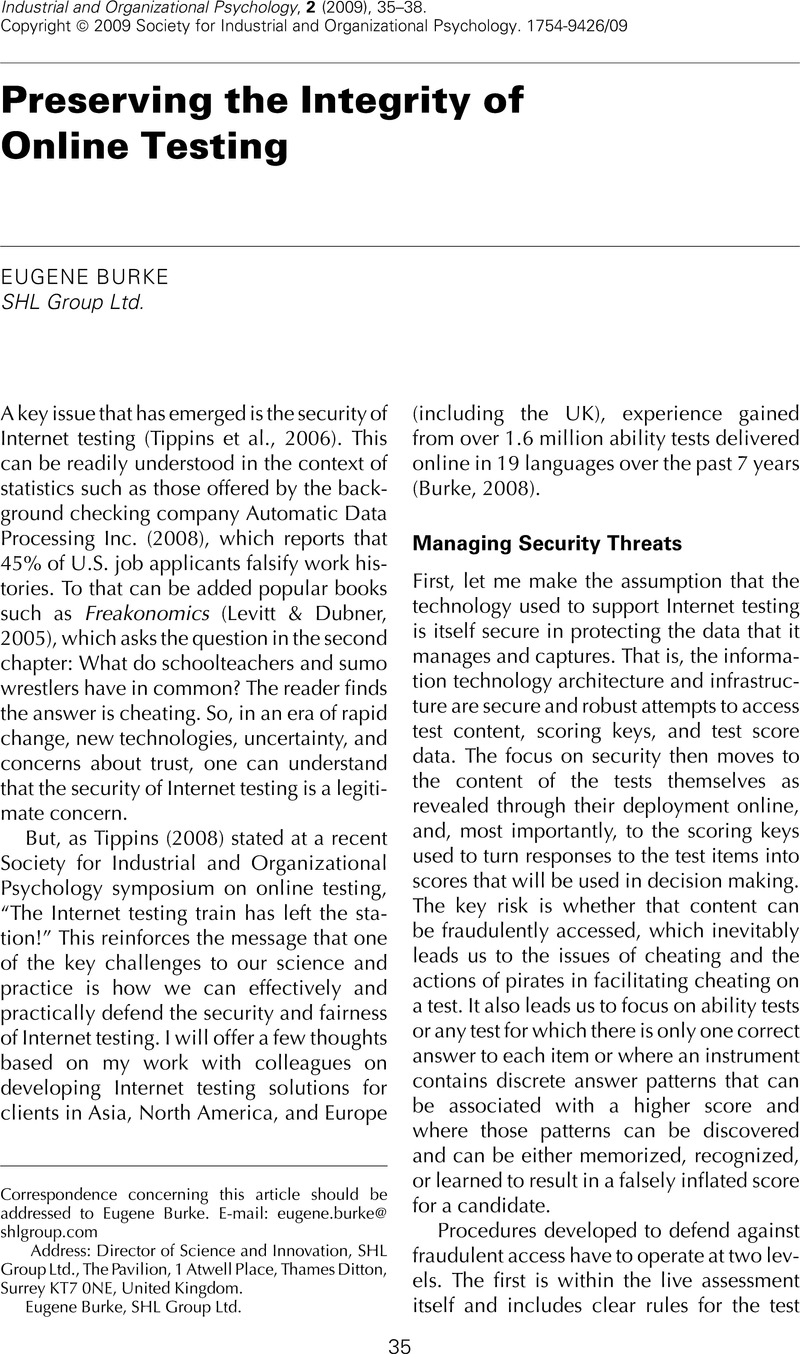Crossref Citations
This article has been cited by the following publications. This list is generated based on data provided by Crossref.
Reynolds, Douglas H.
Wasko, Laurie E.
Sinar, Evan F.
Raymark, Patrick H.
and
Jones, Joseph A.
2009.
UIT or Not UIT? That Is Not the Only Question.
Industrial and Organizational Psychology,
Vol. 2,
Issue. 1,
p.
52.
Tippins, Nancy T.
2009.
Where Is the Unproctored Internet Testing Train Headed Now?.
Industrial and Organizational Psychology,
Vol. 2,
Issue. 1,
p.
69.
Drasgow, Fritz
Nye, Christopher D.
Guo, Jing
and
Tay, Louis
2009.
Cheating on Proctored Tests: The Other Side of the Unproctored Debate.
Industrial and Organizational Psychology,
Vol. 2,
Issue. 1,
p.
46.
Kim, Brian H.
2011.
International Review of Industrial and Organizational Psychology 2011.
p.
181.
Burke, Eugene
Mahoney‐Phillips, John
Bowler, Wendy
and
Downey, Kate
2011.
Technology‐Enhanced Assessment of Talent.
p.
355.
Arthur, Winfred
and
Glaze, Ryan M.
2011.
Technology‐Enhanced Assessment of Talent.
p.
99.
Kim, Brian H.
2012.
International Review of Industrial and Organizational Psychology 2011.
p.
239.
Scott, John C.
and
Lezotte, Daniel V.
2012.
The Oxford Handbook of Personnel Assessment and Selection.
p.
485.
Stowell, Jeffrey R.
Allan, Wesley D.
and
Teoro, Samantha M.
2012.
Emotions Experienced by Students Taking Online and Classroom Quizzes.
Journal of Educational Computing Research,
Vol. 47,
Issue. 1,
p.
93.
Ross, William
and
Slovensky, Ross
2012.
Encyclopedia of Cyber Behavior.
p.
537.
Louw, Gerrit J.
2013.
Exploring recruitment and selection trends in the Eastern Cape.
SA Journal of Human Resource Management,
Vol. 11,
Issue. 1,
Tendeiro, Jorge N.
Meijer, Rob R.
Schakel, Lolle
and
Maij-de Meij, Annette M.
2013.
Using Cumulative Sum Statistics to Detect Inconsistencies in Unproctored Internet Testing.
Educational and Psychological Measurement,
Vol. 73,
Issue. 1,
p.
143.
Ryan, Ann Marie
and
Wessel, Jennifer L.
2015.
Implications of a changing workforce and workplace for justice perceptions and expectations.
Human Resource Management Review,
Vol. 25,
Issue. 2,
p.
162.
Tippins, Nancy T.
2015.
Technology and Assessment in Selection.
Annual Review of Organizational Psychology and Organizational Behavior,
Vol. 2,
Issue. 1,
p.
551.
Hylton, Kenrie
Levy, Yair
and
Dringus, Laurie P.
2016.
Utilizing webcam-based proctoring to deter misconduct in online exams.
Computers & Education,
Vol. 92-93,
Issue. ,
p.
53.
Burke, Eugene
2017.
Psychometric Testing.
p.
43.
Dickter, David N.
Jockin, Victor
and
Delany, Tanya
2017.
The Wiley Blackwell Handbook of the Psychology of the Internet at Work.
p.
257.
Bartram, Dave
and
Tippins, Nancy
2017.
The Wiley Blackwell Handbook of the Psychology of Recruitment, Selection and Employee Retention.
p.
271.
Woike, Jan K.
2019.
Upon Repeated Reflection: Consequences of Frequent Exposure to the Cognitive Reflection Test for Mechanical Turk Participants.
Frontiers in Psychology,
Vol. 10,
Issue. ,
Michel, Rochelle S.
2020.
Remotely Proctored K‐12 High Stakes Standardized Testing During COVID‐19: Will it Last?.
Educational Measurement: Issues and Practice,
Vol. 39,
Issue. 3,
p.
28.



